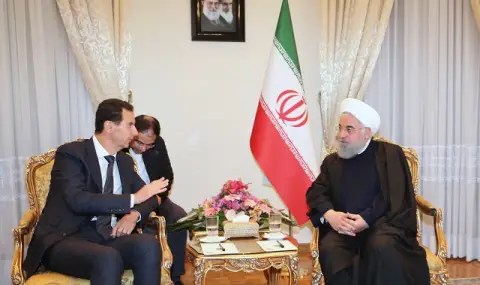The regime in Iran is deeply confused by Assad's fall from power. There is also a clear fear in Tehran that the Syrian example could infect the Islamic Republic. One thing is clear: without Syria, Iran is significantly isolated and without strong allies.
The fall of Syrian President Bashar Assad puts the regime in Iran under serious pressure. Along with Russia, Iran was the ousted dictator's closest ally. Due to its key geographical location, Syria has so far been of key importance to Iran's security strategy in the region.
Syria was a bulwark of the regime in Tehran
Iran has always been able to rely on Assad. Iranian leader Ayatollah Ali Khamenei once called Syria "the pillar of the axis of resistance." He was referring to a network of countries and organizations that oppose Israel and US influence in the Middle East. Syria was also an important corridor for Iran's arms supplies to its allies in Lebanon - the extremist militia Hezbollah.
The overthrow of the Assad family regime, which has been in power for more than 50 years, is a heavy defeat for Tehran. Iran may continue to support militias close to the regime in the region, analysts say. But its financial and military capabilities are now significantly weakened.
Therefore, Tehran will have to change its strategy to maintain its influence and prevent the establishment of a stable order in Syria, Iranian political scientist Mohammad Javad Akbarin told DW. Iran has previously supported destabilizing forces in Iraq and Afghanistan to counter US influence and project power in the region. However, the current economic sanctions against Iran will limit its ability to implement these strategies as it has in the past.
$30 billion for Assad
Support for Syria has come at a high cost for Iran. In 2020, an Iranian parliamentarian said that Iran had given around $30 billion to keep Assad in power.
With Iran’s support and, not least, Russia’s assistance, Assad was able to prevail in the civil war in 2011 and brutally crush the opposition. Assad has been accused of war crimes, including attacks on civilians, torture, and the use of poison gas.
On Platform X, former Iranian MP Bahram Parsai announced that Iranian money had been flowing to Syria without parliamentary approval. Now Parsai wants to know who will pay Syria's debts to Iran after Assad falls.
Many Iranians wonder why their government prefers to support a financial regime abroad rather than tackle urgent tasks at home - such as building schools and hospitals in poor regions.
Hard times ahead
The change of power in Syria allows comparisons to be drawn between the oppressive regimes in Damascus and Tehran, Reza Aljani, an Iranian activist living in Paris, told DW. The efforts of the Syrian rebels to effect a peaceful change of power could serve as an example for Iran if the Islamic Republic one day collapses. Aljani, however, acknowledges that the transition from dictatorship to democracy is a challenge, especially in societies that have been under authoritarian rule for decades.
Iranian propaganda has consistently emphasized the successes of the “axis of resistance.” But Assad’s overthrow puts an end to that boasting and could bring his hard-line supporters in Iran back to reality. Pragmatic factions in the Iranian government are concerned about the possibility of uprisings in the country, according to media reports. The collapse of Assad’s regime could increase the erosion of Iranian society and deepen the gap between the ruling elite and the public.
And as ARD points out, the leadership in Tehran seems confused, most likely out of fear that Syrian relations could spread to the Islamic Republic. Iran is now significantly weakened and without strong allies. The German public-law media outlet notes that in the context of the return of Donald Trump as US president - a staunch enemy of Tehran - and the fact that the majority of the Iranian population wants the end of the Islamic Republic, it can be expected that difficult times lie ahead for the ayatollahs.
